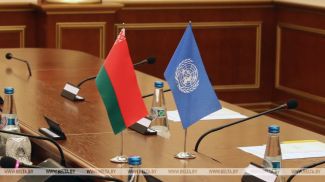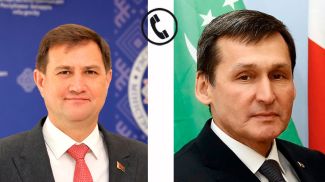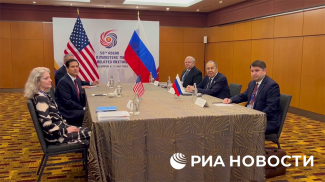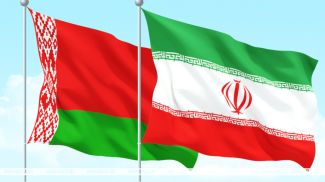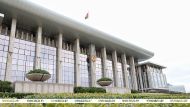The vote on the anti-Belarusian resolution in the UN Human Rights Council in Geneva ended as expected - the majority of the Council members did not support it. Only 20 out of 47 states, or less than a half, voted for it. BelTA asked Permanent Representative of the Republic of Belarus to the United Nations Office and other international organizations in Geneva Yuri Ambrazevich to comment on the resolution, the vote, its impact if any, and why the arithmetic minority in the Council has the power to push through the most unreasonable decisions.
The UN Human Rights Council has adopted another resolution on Belarus, linked by its sponsors to the events surrounding the 2020 presidential election. How does the world see it?
Events in Belarus around the presidential election were presented by a group of Western countries as human rights violations. The UN Council is a tool to advance this position. Balance of votes in the Council and voting regulations make it possible for the arithmetic minority to push through the most unreasonable decisions. At the UN, the absence of a "yes" vote actually means "no" even if someone really abstains. Our critics are well aware of this. This is why, in order to convince the maximum number of partners to vote "yes", the EU held four rounds of negotiations on the text, changed the fundamental things.
Belarus is grateful to the states who did not support the EU's anti-Belarusian initiative and did not vote for the resolution. They are the majority in the Council.
Many countries that abstain do not wish to choose between either side of the confrontation, because they have good relations with each of them. Unfortunately, not all states are ready to vote on the basis of principled approaches. Ambassadors of individual countries openly admit in tete-a-tete conversations that before every important vote the EU twists their hands, threatening to deprive them of financial aid.
We are especially grateful for the integrity of those countries that voted against the resolution: Russia, China, Venezuela, Cuba, the Philippines, Bolivia and Eritrea. Thus, the postulate that Belarus has no support in the world looks ridiculous. Just count the populations of the countries that did not vote for the EU initiative and you will see that those who supported us are an overwhelming majority.
Do you think the HRC's final position is fair?
Belarus views the adoption of another resolution by the UNHRC as artificially putting our country in the undue spotlight in the Council by a group of Western countries. The government did not consider itself bound by the provisions of the resolution.
Moreover, the resolution on Belarus was adopted in violation of the powers of the Council, defined by the relevant resolution of the higher body - the UN General Assembly.
It makes no sense to talk about UNHRC's position and role, since in reality the UN decisions reflect the balance of power between big dominant countries and the medium-size and small states supporting them. I would like to note that this thesis was thoroughly examined in the article by Belarus Minister of Foreign Affairs Vladimir Makei timed to the 75th anniversary of the United Nations.
Moreover, we keep saying that Western countries do not have the right to assert that their assessment of the political situation in other countries, including the situation with human rights, is the absolute and ultimate truth. Before judging and teaching others, they should clean up their own Augean Stables when it comes to human rights. To illustrate this point, I would like to say that the human rights reviews conducted by the UN Human Rights Council in 2020 issued a total of almost 4,500 recommendations for 20 EU countries.
What impact will the resolution have on our country? Will the new decision of the UNHRC affect Belarus' ability to pursue its foreign policy and foreign economic interests?
As to relations with international financial institutions, the current resolution will not add anything new to the decisions that the West had pushed through at the UN earlier.
For those who want to dig deeper, I would like to note that the current UNHRC resolution is another non-binding political document. No matter how its sponsors or Belarusian opposition activists present it, in fact, the current resolution is just a more detailed order for the Office of the UN High Commissioner for Human Rights to track the situation in Belarus and keep the country in the focus on the UN. This order comes from and is financed by the West.
Unfortunately, this resolution is a direct instigation of most radical protesters by the European Union. Thus, the EU is responsible not only for supporting the unrest in 2020, but also for contributing to the destabilization of political processes in Belarus today, which will further worsen the perception of the European Union by the majority of Belarusians.
What rationale do you use when you urge diplomats in Geneva not to support politically motivated initiatives of the European Union?
First, we persuade them that the number of people who are dissatisfied with the Belarusian authorities to such an extent that they vote against Belarus President Aleksandr Lukashenko or take to the streets is insignificant. Such people are an obvious minority against the background of the total number of voters. Which, by the way, is eloquently confirmed by the opposition themselves. Take, for example, the results of their ongoing voting on the Golos platform. Where are those 97% they talked about? Where are at least the official 19.9% of people who did not vote for the current Belarusian president? In many countries, candidates win elections by a margin of just 1-2% of votes, but this does not mean that the losing side has the right to stir up unrest.
Secondly, we explain that there are no preconditions for a revolution in Belarus, protesters had no reasons to make any social and economic demands. This is why the calls for strikes failed. To illustrate this, we call attention to a wide range of respected and independent international rankings that assess various sectors. Belarus ranks high in most of them, placing among developed countries.
Thirdly, we show everyone videos that demonstrate that the protests in Belarusian cities were not always peaceful, contrary to what their participants say. Acts of violence and aggression posed a threat to public order and targeted government buildings.
In addition, we explain that the legal measures taken by the police, including use of force and arrests, were provoked by the protesters' actions that disturbed public order. The police needed to act swiftly and decisively to avoid escalation of violence and prevent new demonstrations. Confrontations between aggressive protesters and law enforcement are always risky and, unfortunately, often lead to injuries on both sides. Eleven people died during the protests of the Yellow vests movement in France in 2018-2019. The events in the United States during the Black Lives Matter movement in the summer of 2020 cost the lives of at least 19 people, although some sources claim casualties were twice as many. During the 2019-2020 fiscal year, at least 18 people died during or following police contact in the United Kingdom. According to mass media, the protests and mass unrest in Chile in 2019 resulted in at least 29 deaths.
We also inform people about the Belarusian legal system, its mechanisms to oversee law enforcement agencies, and explain the law on mass events. We use information provided by the Investigative Committee and other bodies to update people on the status of inquiries and investigations into actions of the riot police and protesters alike.
We also look into the evidence of foreign support of street protesters and rioters, argue that setting up various structures for power transfer is anti-constitutional. We explain that the combination of these factors makes it possible for us to view part of the events in Minsk as a failed coup attempt.
To sum it up, we tell everyone who wants to listen and understand that protests against the election results were ungrounded because the official results of the election objectively reflect political sentiments in the Belarusian society. Unrest and violent activities of the most radical demonstrators provoked response measures and then preventive activities from law enforcement bodies. Although such actions of the government, namely, the Ministry of Internal Affairs, involved the use of force, they were aimed at protecting the legal interests of the majority of Belarusian people who voted for the current head of state. Besides, there was an objective to prevent the overthrow of the legitimate government by the active minority following the Ukrainian scenario, including with foreign support.
What do you tell those foreign partners who echo opposition's statements about the disproportionate response of the government to small-scale protests?
Using the weakness of the Ukrainian government during the maidan the active several dozens of thousands of people prevailed over 40 millions because of their silent inactivity. The coup in Ukraine which involved a geopolitical U-turn of the country to the West resulted in a loss of normal neighborly relations with Russia in virtually all segments of interstate cooperation, a steady and steep decline in living standards, a continuous economic crisis, an ongoing military conflict and huge military spending, a loss of control over a big part of the territory and of almost one fifth of the export.
It is known that the majority of revolutions and coups were carried out by a small but resourceful and motivated minority. A lot was done in Belarus to protect the position of the majority, to prevent uncontrollable forms of violence, the formation of armed and reinforced resistance areas, which was quite a possibility back then.
Then it was the turn of the court system. As a rule, foreign colleagues stop asking questions when you explain why people are in court. No one is charged with shopping nearby. Some indictments read like a riddle: “dragged a policeman on a bonnet”, “fell from a prison truck”, “wanted to troll the police”. When you decipher all that, officials of any country understand everything.




